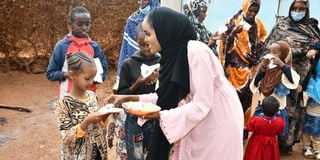Why Kenyan Oromos do not celebrate Enkutatash with Ethiopians, Eritreans

Gumato Denge, a local journalist celebrates her graduation with family members and friends on September 12, 2021 at their home in Marsabit town. The same day Ethiopians celebrated their New Year, which Kenyan Oromos in Marsabit residents did not mark.
To Oromo-speaking Kenyans who pride themselves on their Ethiopian or Eritrean descent, many ceremonies in neighbouring Ethiopia form a vital aspect of their cultural practices too.
They often concurrently mark traditional ceremonies with their relatives across the border in Ethiopia.
However, they have always stood aloof and are fence-sitters during the Ethiopian or Eritrean new-year festivities known as Enkutatash.
Marsabit County Culture Tourism and Culture Director Abdullahi Ibrahim explained that Gabra or Borana communities in Kenya, who share in the Ethiopian traditional celebrations, do not celebrate Enkutatash.
Enkutatash (Amharic language) falls on September 11 (or September 12 during a leap year).
Ethiopia and Eritrea use a unique calendar, which counts its years seven to eight years behind the Gregorian calendar.
“Our people don’t normally celebrate the Ethiopian new year because the festivities have their basis in Orthodox Church beliefs,” Mr Ibrahim said.
He explained that Enkutatash is mainly celebrated by Ethiopians and Eritreans who are deeply steeped in Orthodox Church beliefs.
Not only is the Ethiopian calendar behind the Gregorian one by seven years and eight months, but its year has 13 months.
When the Roman Catholic Church amended the Julian calendar in 500 AD, the Orthodox Church did not make any changes, thus leaving them isolated in the way they calculate the birth of Jesus Christ.
According to Kassahun Chanie, an Ethiopian journalist who spoke to the Nation, the Ethiopian or Eritrean calendar greatly differs from the Western one.
Their new year falls on September 11, or September 12 in a leap year, and at the start of the spring season of the Gregorian calendar.
In their calendar, each month of the first 12 has 30 days while the 13th has five or six days, depending on where the new year falls in the leap year.
Even time is calculated inversely compared with the Western calendar, with each day getting divided into two 12–hour sections.
For instance, making an appointment with a company CEO in Addis Ababa to meet at 7am in the Western calendar will be translated by an Ethiopian or Eritrean to mean 1pm.
“If you’re from other parts of the world where the Western calendar is used, you’ll be shocked to see your appointments with the locals bouncing, perhaps because of the misunderstandings on the time calculations,” Mr Chanie said.
Present friends with bouquets
Ethiopians’ or Eritreans’ counting of years begins in year eight of the Common Era, which follows the calculations of Dionysius, a sixth-century monk.
Non-Chalcedonian countries, which comprise branches of Christianity that do not accept theological resolutions of the Chalcedon, the Fourth Ecumenical Council that was held in 451 AD, continue to use the calculations of Annius, a fifth–century monk, which had placed the Annunciation of Christ exactly eight years later.
For this reason, on Enkutatash of the year 2016 of the Gregorian calendar, it became 2009 in the Ethiopian and Eritrean calendar.
Enkutatash is loosely translated as “gift of jewels,” a name derived from the story of the Queen of Sheba, which according to the Bible is when the ancient queen of Ethiopia travelled to Jerusalem to meet King Solomon.
Enkutatash celebrations usually begin with church activities after midnight on the eve of the day and last into the next morning.
After attending church services in the morning, families gather to share a traditional staple or pancake known as anjera or injera together with a sauce (wat), and make merry through singing and dancing.
Later in the day, young girls donning new clothes gather daisies and present friends with bouquets while singing new-year songs known as “abbebayehugn”, meaning “I have seen flowers,” with hand drums.
Young boys, for their part, often present pictures they have painted, with expectations of praise and gifts.
This new year festivity brings extended families together and a series of events such as the slaughtering of a cow, sheep or goat in each household.
In Ethiopia or even among the Oromo-speaking communities in Kenya, to be invited to a coffee ceremony by a family is a sign of great honour or respect.
Not only is Enkutatash a religious holiday, according to the Ethiopian Tourism Commission, but it is also the season for exchanging new-year greetings and cards among the urban folk in the form of bouquets.
The Ethiopian or Eritrean new year usually begins when heavy rains start to cease, and a bright sun shines over green land, which is adorned by the golden yellow flower known in the Amharic language as “adey abeba”.





